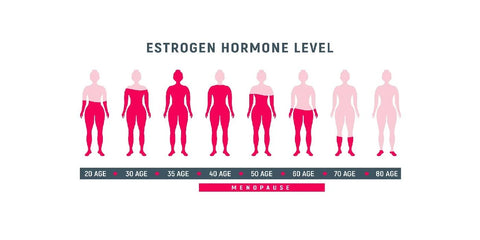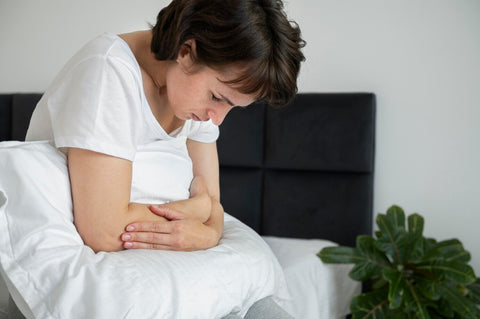Menopause is another stage in a woman's life after the fertile stage. On the one hand, the ovaries stop releasing eggs to be fertilized, so fertility is lost . And, on the other hand, this is accompanied by a loss of the ability of the ovaries to produce female reproductive hormones . Among them, estrogens , which have a protective function in women and intervene by regulating the function of many processes in our body. During this phase, hormone levels fluctuate, causing a series of symptoms that can affect quality of life. Menopausal Hormone Therapy (MHT) is a treatment option designed to alleviate these symptoms, mainly due to the decrease in estrogen production.
What is menopausal hormone therapy?
Menopausal Hormonal Therapy consists of the sequential administration of estrogen and progesterone , since the production of estrogen naturally decreases until it disappears throughout the menopausal transition. This is why the hormones that are lost during the menopausal transition are administered in order to recover the functions and beneficial effects that estrogen, among other hormones, had on the woman's body . Progesterone is only administered to women with a uterus, to prevent excessive growth of the endometrium (internal layer that lines the uterus) as a result of the administration of estrogen.
It can be administered orally in the form of tablets and will act systemically (throughout the body) or locally via transdermal spray, cream, patches, suppositories or vaginal rings. One route or another will depend on the preference of each woman and the decision of the specialist doctor.
Is Menopausal Hormone Therapy the same as Hormone Replacement Therapy?
At MADEQUA we believe it is important to highlight the difference between one and the other because they are not the same , they are not indicated for the same profile of women. According to the AEEM (Spanish Association for the Study of Menopause) it is key to distinguish them since the term Hormone Replacement Therapy (HRT) is limited to women with early or premature menopause or what we currently call Primary Ovarian Failure ( POI ), which is when symptoms appear before the age of 40 and in these cases this therapy replaces / substitutes the hormones that the body stops producing prematurely, balancing hormonal levels and improving quality of life. In these cases it is essential to address early menopause with Hormone Replacement Therapy and the sooner the treatment is started, the better.
When to start Menopausal Hormone Therapy?
Determining the right time to start Menopausal Hormone Therapy is crucial . It is generally indicated for use within the first 10 years after menopause and in women under 60 years of age . At MADEQUA we advise consulting with a doctor to assess the specific risks and benefits based on your health history. Menopausal Hormone Therapy is not suitable for all women, and a professional can help you make the best decision.
Eligibility criteria is it suitable for me?
The AEEM has prepared a colour-coded (very visual) document containing a series of recommendations for the safe use of menopausal hormone therapy in different medical circumstances.
It is not recommended for women who:
- Think you might be pregnant.
- Have problems with vaginal bleeding.
- Have problems with vaginal bleeding.
- They have suffered or are suffering from certain types of cancer.
- They have suffered a stroke or a heart attack.
- They have had blood clots.
- Have suffered or suffer from liver disease.
Side Effects of Menopausal Hormone Therapy
Like any treatment, Menopausal Hormone Therapy can have side effects . These include headache, upset stomach, vomiting, bloating, diarrhea, and changes in appetite and weight. In the case of giving progesterone (necessary for women with a uterus) its side effects are increased appetite, weight gain. It also increases the chances of suffering blood clots, heart attacks, strokes, and breast cancer. It is important to monitor these symptoms and report them to your doctor; a regular medical evaluation is essential to minimize these risks.
According to the AEEM (Spanish Association for the Study of Menopause) and the SEGO (Spanish Society of Gynecology and Obstetrics), Menopausal Hormonal Therapy does not substantially increase the risk of breast cancer . The benefits outweigh the risks simply by properly selecting the patients to whom it is prescribed and choosing the most appropriate dose, preparation, combination and route of administration in each case. In other words, it is key to individualize and make it a shared therapeutic decision.
Benefits of Menopausal Hormonal Therapy
MHT offers numerous benefits. In addition to alleviating menopausal symptoms , the therapy can help prevent bone loss and reduce the risk of osteoporosis. It can also improve overall well-being , including mood and sleep quality. For many women, MHT represents a significant improvement in quality of life during menopause .
It is the most effective treatment for vasomotor symptoms such as hot flashes and genitourinary syndrome of menopause (which includes vaginal dryness and atrophy among many other symptoms). In addition, it has been shown to prevent bone loss and fractures .
If Menopausal Hormone Therapy is not a viable option for you, there are alternatives.
Alternatives to Menopausal Hormone Therapy
Hormonal therapy with pellets or bioimplants
The AEEM recommends using only hormone therapy approved by drug regulatory agencies and avoiding unregulated treatments , such as bioimplants or pellets (intradermal implants that release hormones progressively), due to their possible toxicity and uncontrolled adverse effects.
Non-hormonal alternatives
In general, women with breast cancer cannot use Menopausal Hormone Therapy, since this type of cancer is estrogen-dependent. Or women who are more reluctant to use hormones, what options do these women have?
Fezolinetant , the first non-hormonal drug for hot flashes , was approved for marketing by the Food and Drug Administration in May 2023.
Ospemifene is the first non-estrogenic orally administered drug approved for the treatment of genitourinary syndrome of menopause.
Cognitive behavioral therapy attempts to help people identify and change patterns of thinking and behavior. Together with hypnosis, it may help in the treatment of hot flashes.
Natural products are another option for women looking for something more natural or for women with breast cancer (in the latter case, as long as they do not have an estrogenic effect). There are natural preparations on the market without an estrogenic effect, such as black cohosh , which is very effective for treating hot flashes, or sea buckthorn (omega 7), which is very effective for dealing with dry mucous membranes.
MADEQUA Solutions offers a variety of natural supplements with effective and scientifically supported doses that go to the origin and not to the specific symptom, allowing you to face menopause from a comprehensive approach . Helping to manage not only one symptom of menopause but several, from a holistic view of health. They are complementary to the use of Menopausal Hormonal Therapy . In addition, at MADEQUA we promote a healthy lifestyle where sleep care, diet and exercise are fundamental pillars for general well-being.
Menopausal Hormone Therapy can be an effective tool for managing certain symptoms of menopause. However, it is not the only option. Natural alternatives, such as MADEQUA supplements, can be another option or even complement Menopausal Hormone Therapy for a much more complete and comprehensive health care . In addition, we offer specific packages for each stage of menopause to better fit the specific needs of women at each stage.
You can also take our test to get to know yourself better and determine what stage you are in, receiving lifestyle recommendations designed by more than 50 doctors and the most suitable package for you.
At MADEQUA, we recommend that you consult a health professional to find the best approach for your well-being during menopause and that it is always a shared and informed therapeutic decision.
References
AEEM-SEGO position statement on menopausal hormone therapy. Prog Obstet Ginecol 2018;61(3):232-236.
Menopause & Hormones Common Questions. FDA Office of Women's Health. 2019. https://www.fda.gov/consumers/womens-health-topics/menopause
AEEM-SEGO Information Note regarding the association between breast cancer and menopausal hormone therapy. Prog Obstet Ginecol 2019;62(5):433-435. DOI: 10.20960/j.pog.00226
https://aeem.es/criterios-de-elegibilidad-de-la-thm/
Arrianza Peso E, Arevalo Paez M del C, Grandas Alonso MA, Olleros Izard T. Efficacy of black cohosh for the treatment of vasomotor and psychic symptoms in menopausal patients. Progress in Obstetrics and Gynecology . 2009. https://www.sciencedirect.com/science/article/abs/pii/S0304501308710501
Larmo PS, Yang B, Hyssälä J, Kallio HP, Erkkola R. Effects of sea buckthorn oil intake on vaginal atrophy in postmenopausal women: a randomized, double-blind, placebo-controlled study. Maturitas. 2014 Nov;79(3):316-21. https://pubmed.ncbi.nlm.nih.gov/25104582/
Fasero M, Sánchez M, Baquedano L, Gippini I, Fuentes D, Navarro C, Beltrán E, Lilue M, Porcel I, Pingarrón C, Herrero M, Romero P, Ortega T, Carretero E, Palacios S, Mendoza N, Coronado PJ . Hot flashes, MenoGuía AEEM. First edition 2023.




Comments (0)
There are no comments for this article. Be the first one to leave a message!